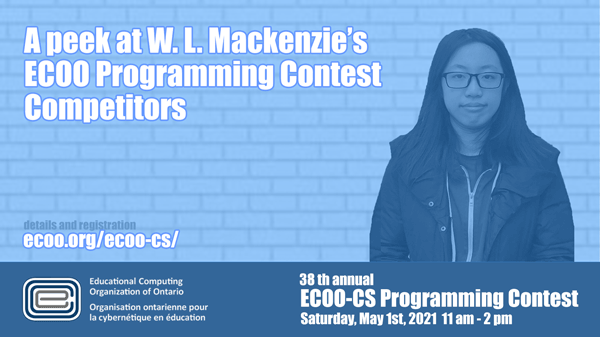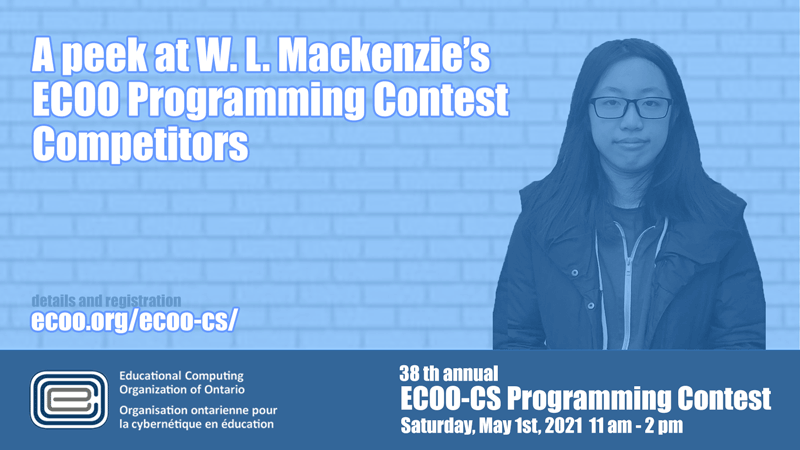A Peek at W.L.Mackenzie’s ECOO Programming Contest Competitors
Guest post by Misheel Batkhuu, student at William Lyon Mackenzie CI, Toronto DSB.
As the 2021 ECOO-CS Programming Contest draws near, coders from across the province are eagerly registering to participate. At William Lyon Mackenzie CI, preparations are also being made to host the 2021 contest. As a school with a long history of accepting and developing exceptional programmers, hosting the ECOO Programming Contest is like embracing our identity – a chance to contribute to a cause we widely support. For student competitors at W. L. Mackenzie, it means that and more. Here are the thoughts of four students.

Nicole (Grade 11), Celeste (Grade 11), Leyang(Grade 10), and Vincent (Grade 10) are all passionate and talented programmers, with Vincent even saying, “it’s a unique hobby of mine. Maybe even the first thing that comes to mind when I think about my school life identity.” Despite all being successful in coding competitions, however, these students do come from very different backgrounds.
How long have you been coding for and coding competitively?
Celeste: “I’ve been coding competitively since grade 9, so that’s 2.5 years. I did do code for a couple of years before that, let’s say 3.5 years? I started with random static web pages in HTML/CSS/JS that you can interact with.”
Nicole: “I’ve been coding for approximately 3 years, and competitively for approximately 2 and a half.”
Leyang: “I have been doing competitive programming for almost 3 years now, since early grade 8. I was first exposed to programming through a class at an extracurricular school where I began to take classes in competitive programming each week.”
Vincent: “I started coding officially in grade 6 at an after-school programming club hosted at a high school club (that let nearby elementary school kids join as early as grade 5). My parents don’t have a programming background and so didn’t really know anything about it either. I started because of my friends.”
What goes through your head when you code competitively?
Celeste: “It depends if there’s pressure. In general with problem-solving, upon understanding the question and a potential solution I can get quite motivated to figure out how to make it work. I try not to focus on nerves because I’d rather focus on the problem. [Then, ] upon concentrating on the program, I forget about nerves. Coding can be captivating.”
Nicole: “When I enter coding competitions I feel very excited and my brain instantly starts to process things faster. I also feel more concentrated, and rarely get distracted by any external noises/distractions. I usually feel like I get an ‘adrenaline rush’ and begin moving and typing faster.”
Leyang: “It really depends on which competition it is. For something more serious, obviously I will feel nervous. For something less serious, I may be excited to see the problems. Either way, it’s a good experience to learn.”
Vincent: “During competitions, it depends on the weight of the competition and the time limit. I’d say it is very similar to competitive math, usually, I’m pretty tense (rushing to solve the easier problems). Then after a while, things slow down just like when writing math contests, and by the end, when all problems have been read and attempted in some way, I feel pretty good and satisfied.”
Did you enjoy, or knew that you would eventually enjoy, programming from the start?
Celeste: “Well, I did enjoy it from the start. [It was] ‘captivating,’ to use the word again. What I like about programming, in general, is that a piece of code will technically do exactly what you tell it to do. So when something isn’t working, then you have to figure out; in blunt words, why your instructions are wrong. When you finally get something to work, the resulting state of mind is quite nice – delightful.”
Nicole: “Not at all! I actually had an argument with my mother when she wanted to sign me up for coding classes, not knowing how much I’d like them. I think it just seemed really tedious and I thought I would be really bad. Back then I couldn’t even use Scratch. I think I also believed that my interests didn’t align. Before I started coding, I enjoyed subjects like science and English, and I had no idea I’d end up liking coding much more! Well, I [ended up realizing] I liked coding within only a few hours of class.”
Leyang: “I think that I knew I liked it from the start, but it did take a while to get familiar with a lot of the concepts and such. Either way, I am very happy to have been introduced to it. Through programming I’ve met so many new people. Especially at WLMAC.”
Vincent: “I’d say I really did. It was like a game really; with an infinite number of puzzles and problems, with a unique interface (solving by coding) as opposed to regular problem-solving (pencil and paper).”
What is it like to be a girl in this field?
The angles and curves in our world are constantly shifting, including those of gender divides. Nicole and Celeste, who are inspirational female figures, are determined to contribute to those movements through programming. Here, they share what it’s like to be a girl in this field.
Celeste: “Girls are generally under-represented in the tech industry, including computer programming and competitive programming, so it’s nice to know that I help to increase female representation in STEM. There is, unfortunately, a strong chance that I’ll face battles later on simply because of gender. I hope to help break down gender barriers in tech for the present and future generations to come.”
Nicole: “Well, it means that I usually have more opportunities! Since the world is adjusting to provide more opportunities for females, there are more competitions available for me.”
What exactly does it mean to represent W.L.Mackenzie on the level that they do?
Coming back to all four competitors, now that they are all proficient, what exactly does it mean to represent W.L.Mackenzie on the level that they do? Traditionally ECOO is a team competition and, although this year it is individual, we can all agree that schools are still collective teams as students’ results ultimately showcase their school.
Celeste: “I would think that WLMAC is regarded as a strong school in CS competitions, so it’s almost a bit daunting sometimes to think of being a representative of such a tier. But it’s also quite the honour by that definition.”
Nicole: “It feels very special, and I feel honoured to be able to represent WLMAC! I also feel more prideful when I do well – it feels like I am contributing to the amazing team we have.”
Leyang: “I am proud to present WLMAC in a competition such as the ECOO Programming Contest along with my peers. For me, it’s a great way to do something I enjoy while benefiting the school.”
Vincent: “It feels pretty cool to represent WLMAC because WLMAC is active and involved in CS (like, we have MCPT, MCPT online judge, and we host a bunch of seasonal contests). Even now, WLMAC is directly hosting a big event like the ECOO Programming Contest. I think it’s super cool to compete in something you like AND something that your school backs passionately.”
What makes the ECOO Programming Contest special?
Celeste: “Though the team and collaborative aspect of the ECOO Programming Contest has been removed due to the pandemic, which of course would have introduced a different experience to competitive programming, ECOO competitors still consist of the top programmers across Ontario. In that regard, the contest does feel a bit special, as it’s both provincially localized while still being a culmination of effort and study in competitive programming.”
Nicole: “It’s an amazing competition and opportunity to compete against other students in Ontario, and it’s one of the few contests of the year!”
Leyang: “As one of the people who participated in it last year I think that it’s an amazing opportunity both for experienced students and for beginners to get into programming. More people can get introduced to competitive programming. As well, it gives us another chance to demonstrate our usually strong performance in these competitions. All in all, I see it as a great opportunity both for the school and the students.”
Vincent: “Under normal circumstances, I think it’s a great opportunity to practice both individual programming skills and collaboration skills in a fun and exciting way.”
May 1st is coming up, and the ECOO Programming Contest with it, so we wish all the best to every competitor, not just Celeste, Nicole, Leyang, and Vincent. We also hope that through hosting ECOO Programming Contest for 2021, the Mackenzie Collegiate Programming Team can help spread our passion for coding to equally diverse and enthusiastic individuals across Ontario.

About the Author: Misheel Batkhuu is a grade 10 student at W. L. Mackenzie CI. Although she has yet to reach the level of competitive programming, she is fascinated with computer science and is working towards becoming more familiar with it. Misheel is also a passionate pianist, karate practitioner, aspiring yogini, and writer. She is a romantic, in the sense that she is a visionary. Her ultimate goal is to help bring positive change to the world, little by little, starting by bringing attention to the ones already stirring waves in her local community.
The ECOO Programming Contest is open to secondary school students from all across Ontario. Please share this article and the link to the contest page/registration with Computer Science educators and secondary students so that everyone can have the opportunity to consider experiencing this exceptional event.


